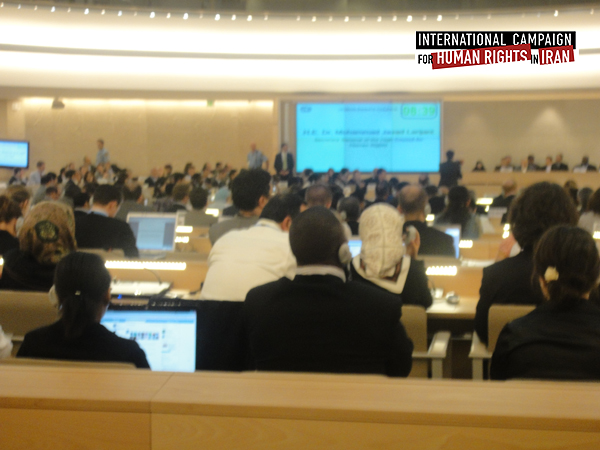Iran Fails to Block Critical Human Rights Council Statement
Maneuver to Evade Scrutiny Shows Need for Follow-Up
 (Geneva, 15 June 2010) The International Campaign for Human Rights in Iran welcomed a statement by a broad, cross-regional group of 56 countries, expressing serious concern about the human rights crisis in Iran, which was issued today at the United Nations Human Rights Council.
(Geneva, 15 June 2010) The International Campaign for Human Rights in Iran welcomed a statement by a broad, cross-regional group of 56 countries, expressing serious concern about the human rights crisis in Iran, which was issued today at the United Nations Human Rights Council.
Iran along with a number of supporting states attempted to block the statement, but their procedural maneuver was dismissed by a ruling by the Council President, in which he allowed the statement to be read.
The statement, read by Norway on behalf of the 56 signatories, called on the Iranian government “to allow freedom of expression, freedom of the media and of assembly; to take all measures necessary to ensure the protection of religious minorities; to respect the human rights of prisoners and detainees; to ensure equal treatment of women and girls in law and practice; and to conduct an independent investigation regarding killings, arrests and detentions following the demonstrations following the 2009 elections.”
“We cannot let this Human Rights Council’s session go by without marking the one year anniversary of these events this month,” the statement added.
The 56 states endorsing the statement included Japan, Chile, Peru, Argentina, Liberia, Mexico, Bosnia-Herzegovina, EU members, the United States, and Canada.
Iran, North Korea, Sudan, Cuba, and a number of other states insisted that the statement, which discussed Iran’s need to implement the “Vienna Declaration,” did not belong in the agenda item devoted to that general issue.
“We appreciate the Council President’s decision, which turned away a political attack on its work, and affirms that the Human Rights Council can and should address actual human rights violations,” said Aaron Rhodes, a spokesperson for the Campaign.
“But it is regrettable that many states backing Iran’s futile attempt to protect itself from scrutiny are indifferent to human rights abuses there, and presumably in their own societies as well,” he said.
The Campaign welcomed the statement as an effort to ensure that the people of Iran, like those everywhere, are able to enjoy universal human rights.
The United Nations concluded its Universal Period Review of Iran on 10 June. While the Islamic Republic agreed to implement a number of important recommendations, it largely defied calls by members of the international community to address its most serious violations. For example, Iran refused to invite the UN special rapporteur to investigate evidence of systematic torture, and to implement international standards that would end discrimination, claiming such reforms would contradict its own laws. Iran denied that it had violated basic civil and political rights, including the rights to freedom of speech and assembly, as authorities and a massive security apparatus clamped down on protests planned for the 12 June anniversary of Iran’s disputed 2009 presidential election.
“Above all, Iran’s attempt to block the appropriate work of the Human Rights Council today, and the Outcome Report of Iran’s Universal Periodic Review, affirm that the international community needs to do more to convince Iran to stop violating human rights,” Rhodes said.
“The United Nations needs a monitoring mechanism to more closely engage Iran, and to keep the tragedy faced by the Iranian people on the international agenda,” he said.






